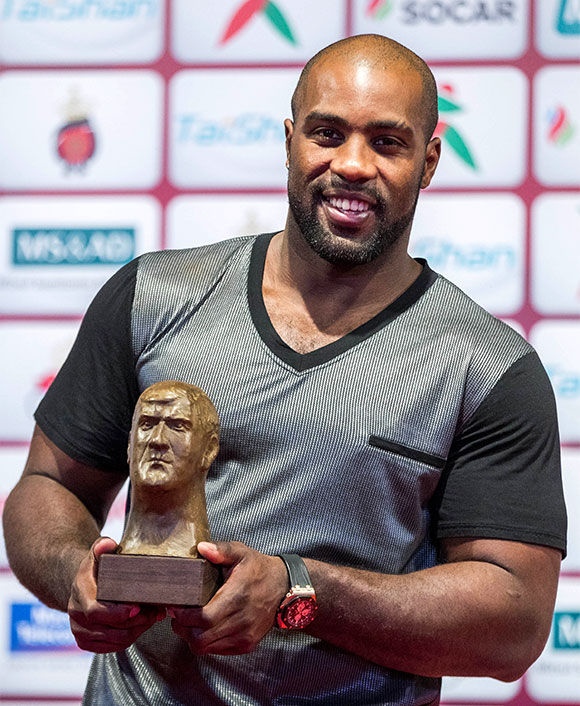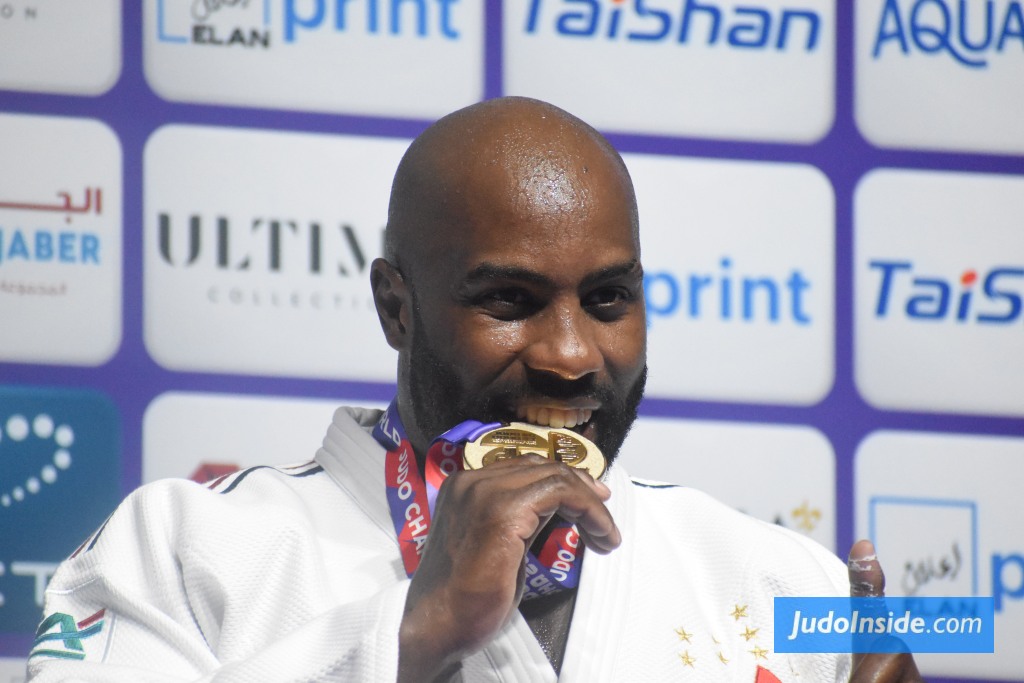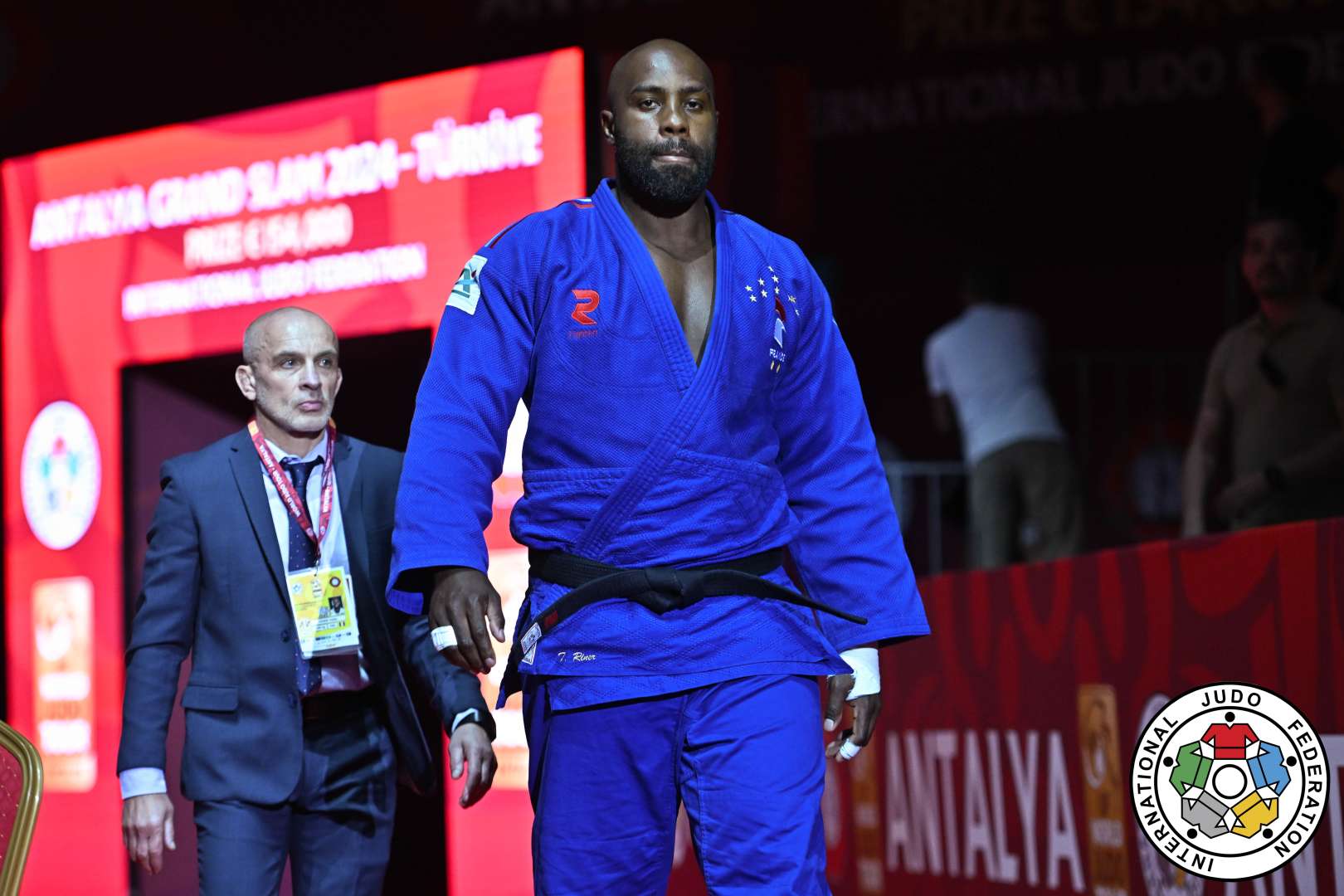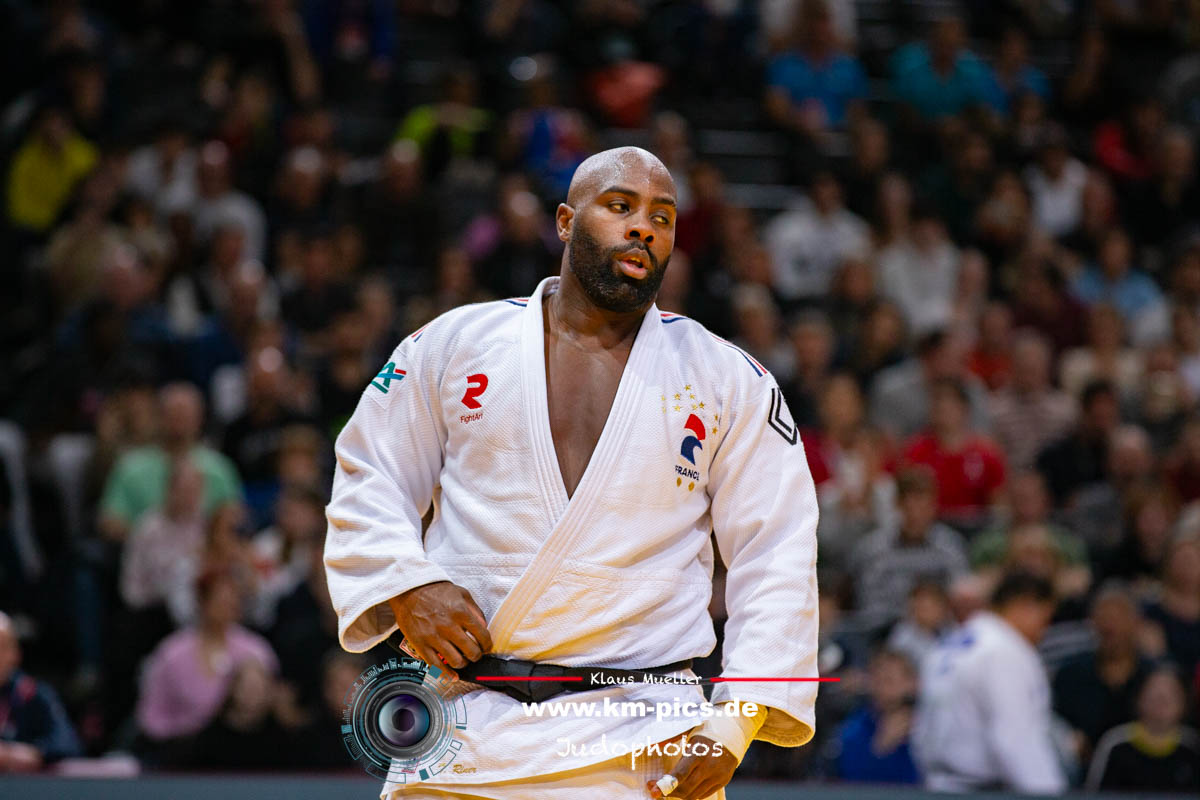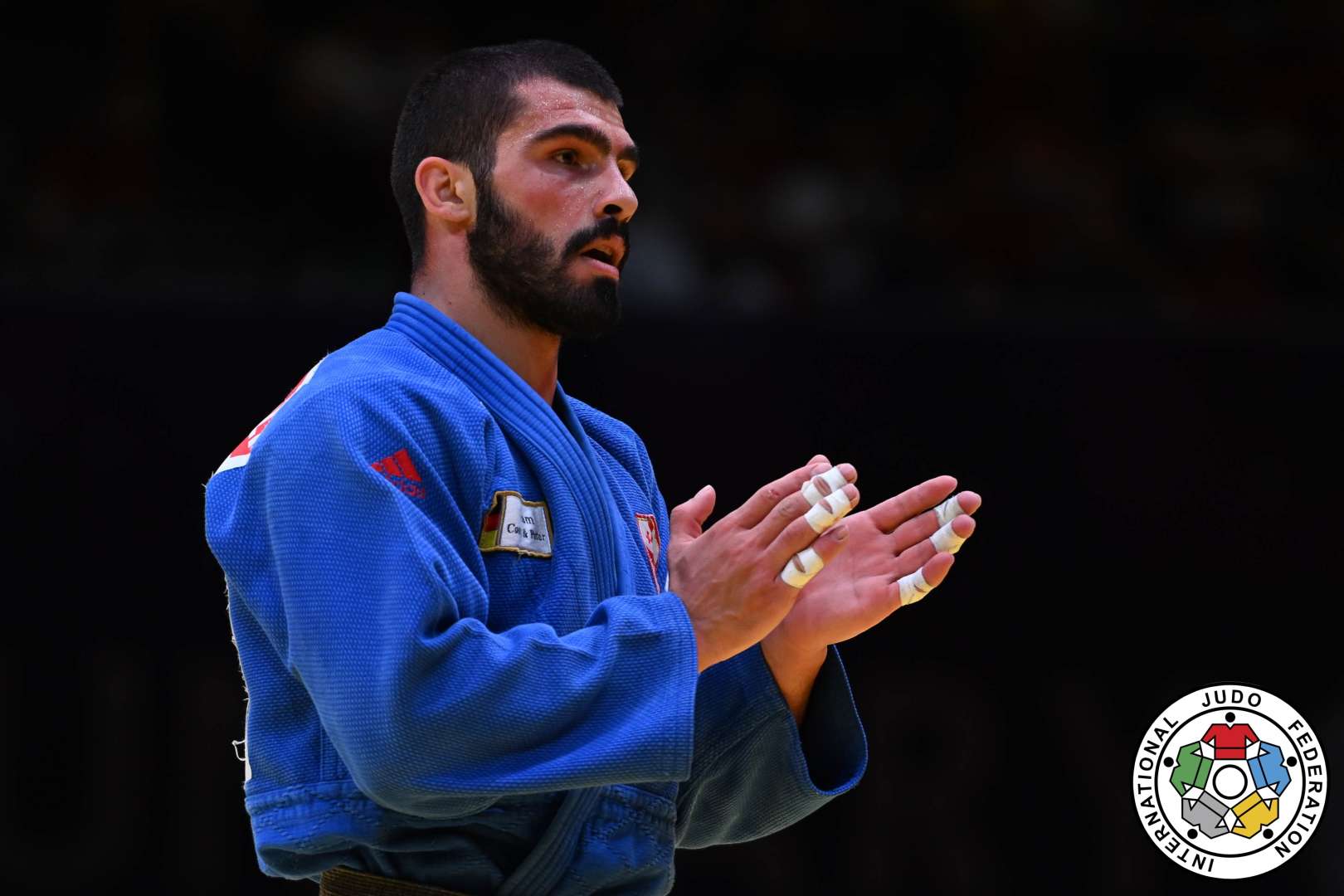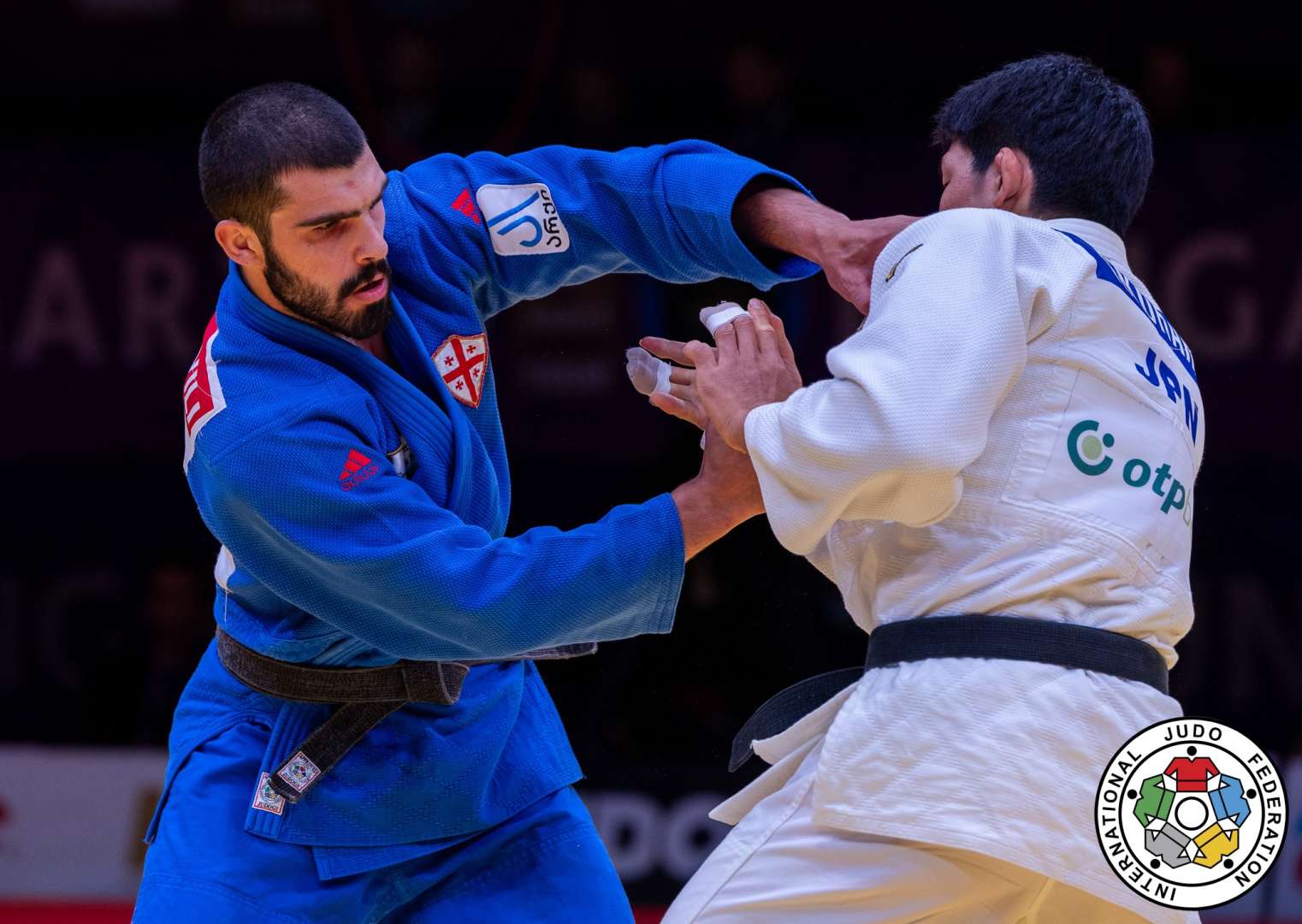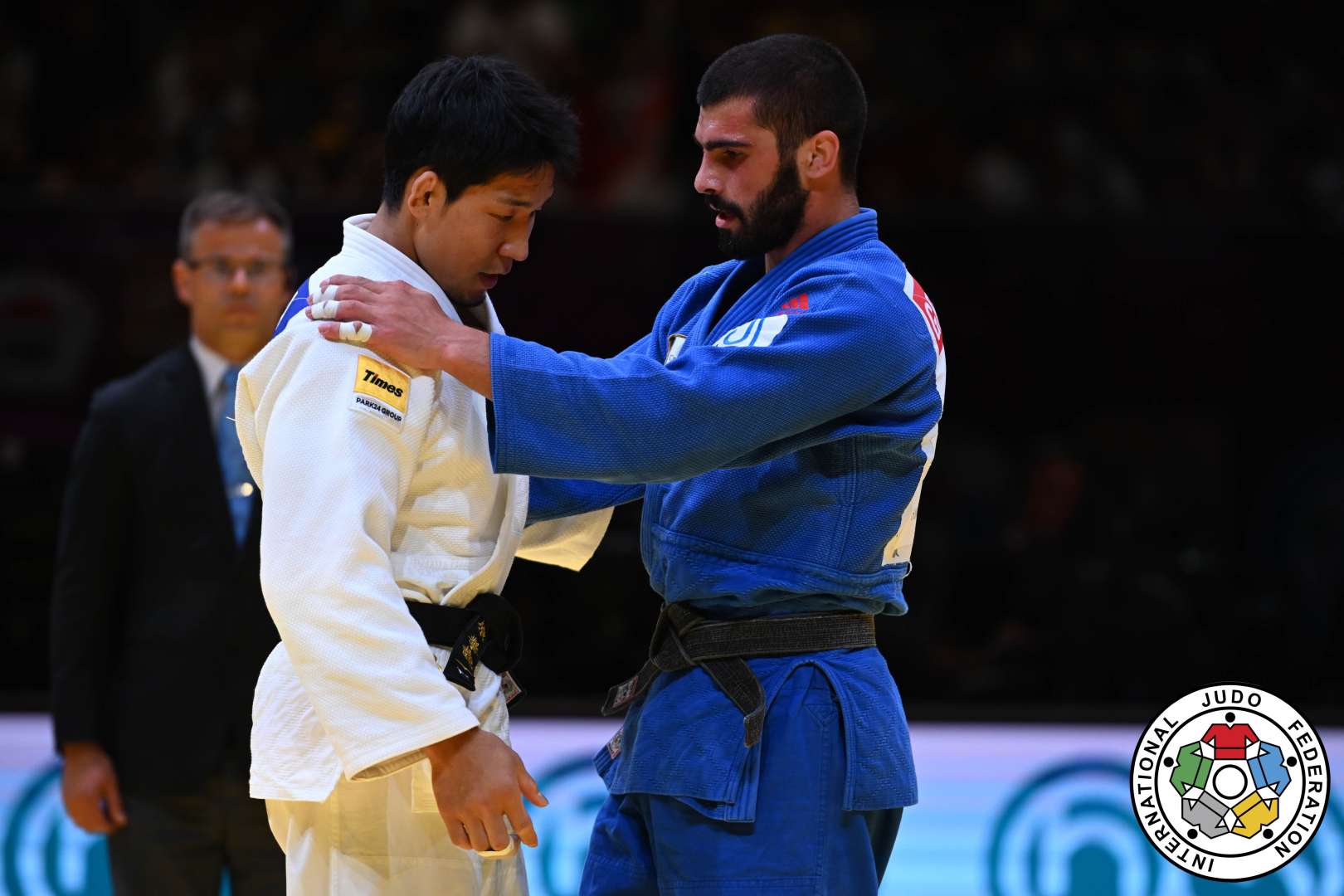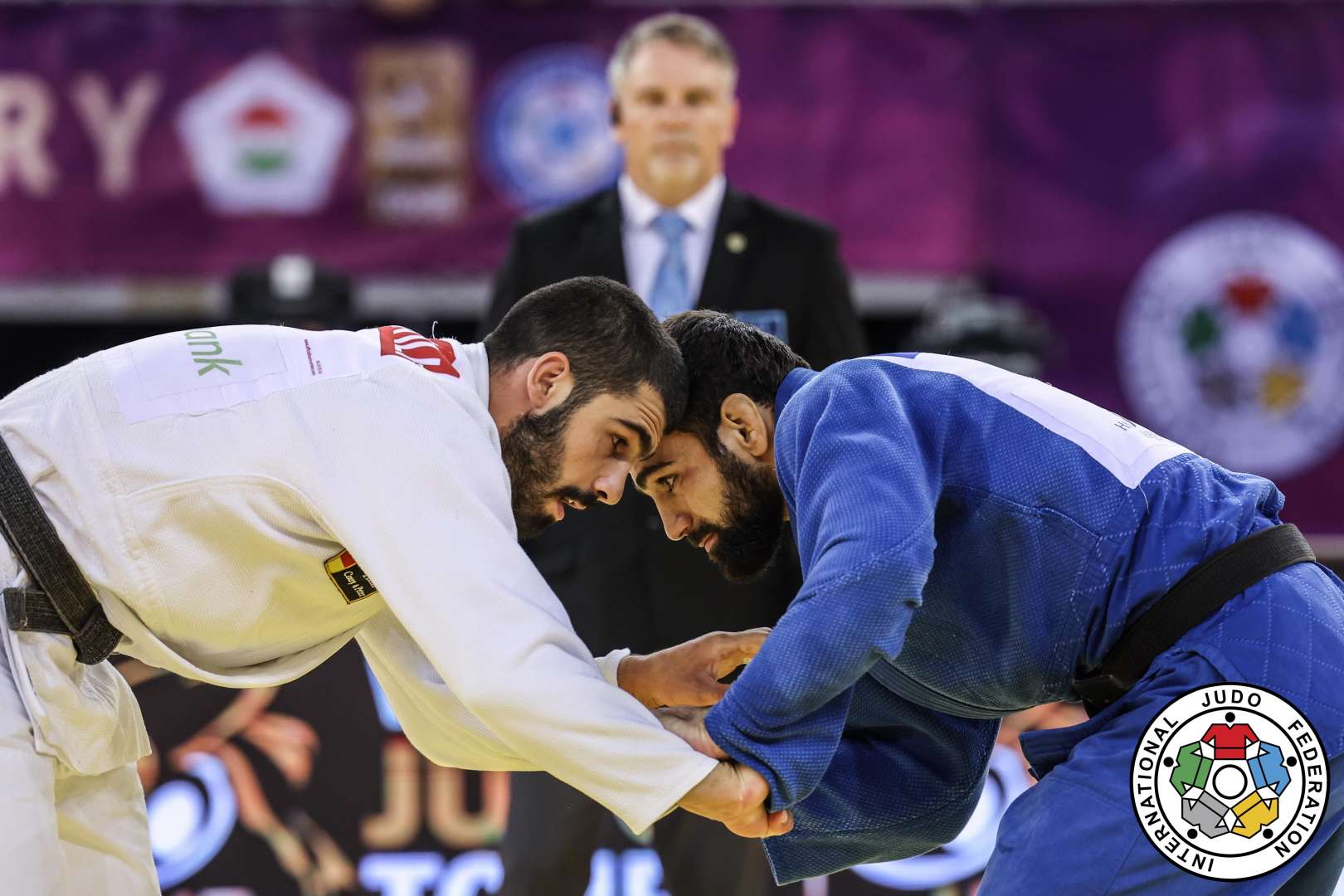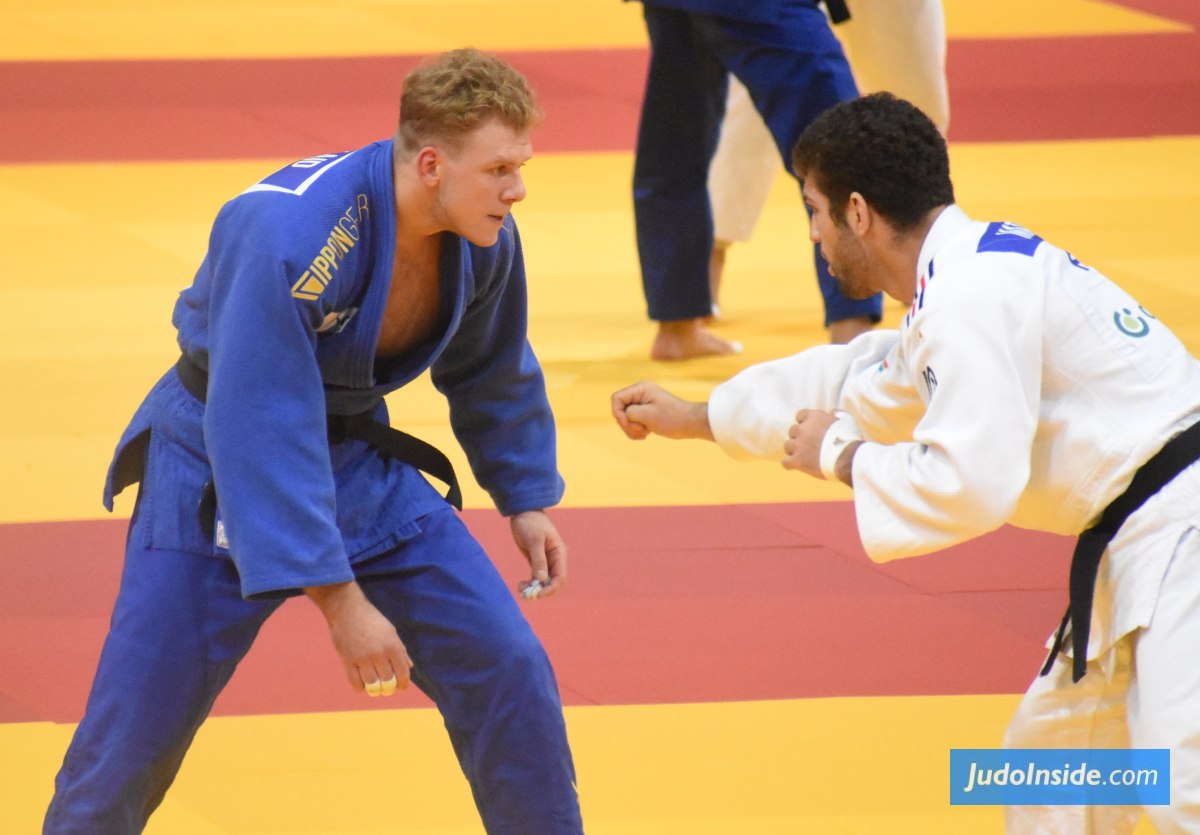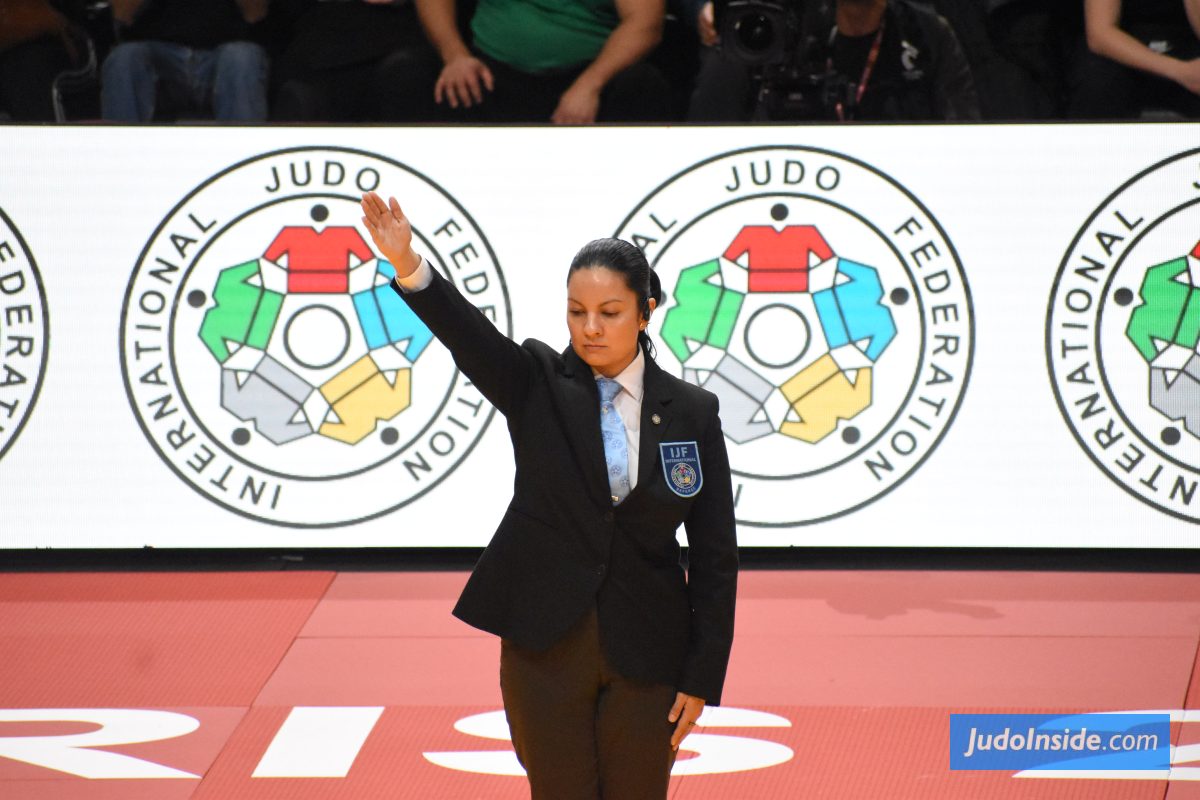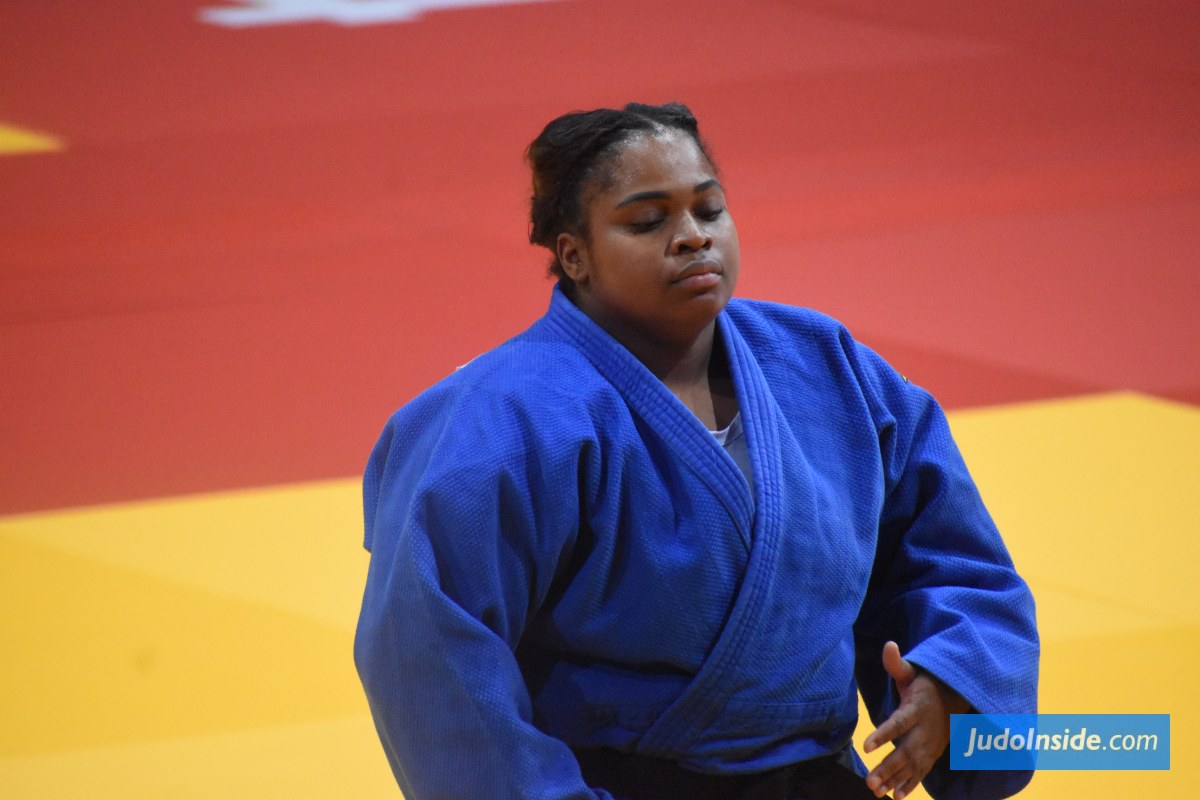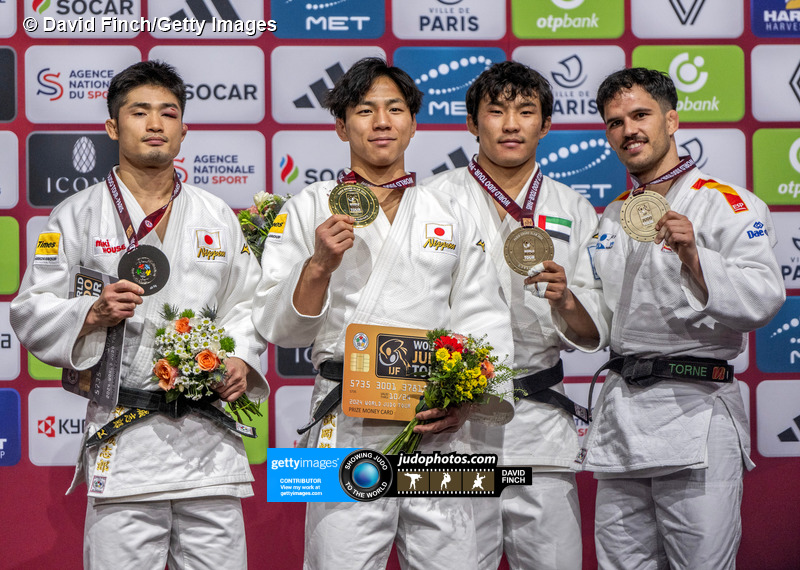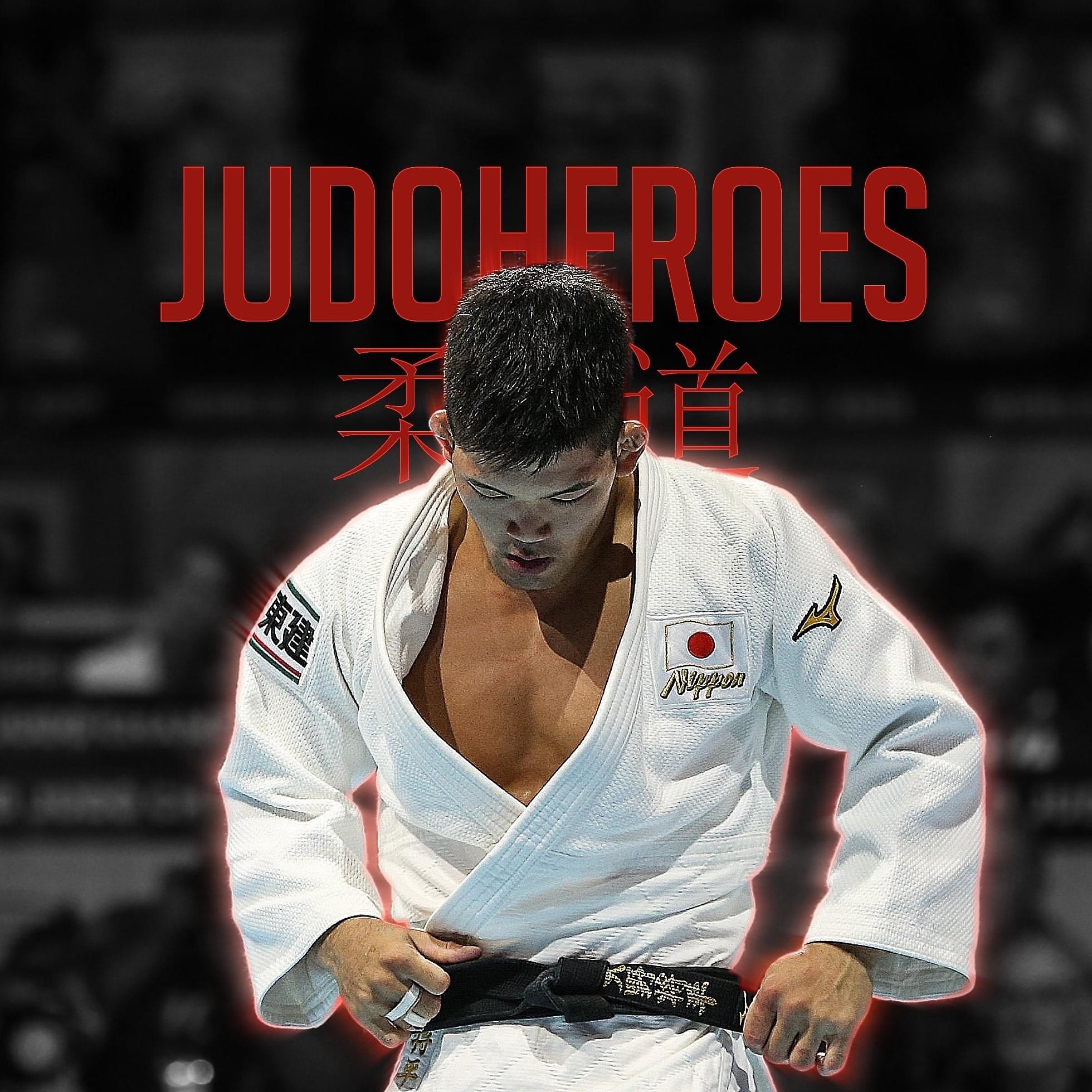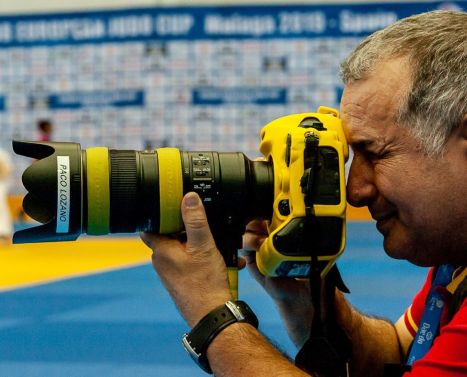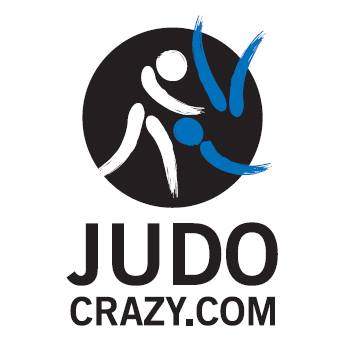Big Birthday for Teddy Riner starting the last chapter

 7 Apr 2022 10:55
7 Apr 2022 10:55
 by JudoCrazy and JudoInside
by JudoCrazy and JudoInside

If you ask judokas who’s the great player of all time, old-timers would probably say Anton Geesink or Yasuhiro Yamashita. Players who came of age in the 1990s might say Toshihiko Koga. But many players today would probably say Teddy Rine who celebrates his 33rd birthday today.
It’s hard to argue that Riner is not the greatest. He has a whopping 10 World titles and three Olympic gold medals (yes, it’s three if you count the Mixed Team gold medal). On the surface his results alone should settle the debate right there and then. But when you look at the details and nuances, you’ll find there’s plenty of room for argument.
It’s hard to argue that Riner is not the greatest. He has a whopping 10 World titles and three Olympic gold medals (yes, it’s three if you count the Mixed Team gold medal). On the surface his results alone should settle the debate right there and then. But when you look at the details and nuances, you’ll find there’s plenty of room for argument.
It must be mentioned of the 10 World titles, two of them were won in the Open and +100kg (in 2017) which are essentially the same thing. Other players in lower weight categories don’t have the chance to win two weight classes which are essentially the same (imagine a -60kg player also being allowed to go for another gold in the “Lightweight” category).
But even if you were to discount the Open as being just a repeat of the +100kg, Riner still has a whopping nine Word titles. This was achieved over a span of 11 years, from 2007 to 2017, during which time he had the chance to try for a World title 11 times (eight of them were for +100kg and three for Open Weight).
Now, consider this: Shozo Fujii of Japan won the World Championships four times, over a period of nine years (1971 to 1979). The difference is that back then, World Championships were held once every two years and the 1977 version was cancelled. So, Fujii had only four chances and he won each and every one. It’s reasonable to argue that had he been given the chance to compete in nine World Championships during that period, he could have won it nine times. But we’ll never know because he was never given that opportunity.
The great Ryoko Tani won seven world titles, from 1993 to 2007. That’s basically 15 years, during which time she competed in seven World Championships and won each and every one. Imagine if she had had the chance to compete in 15 World Championships. How many could she have won? Again, we’ll never know.
Riner competes in an era where the World Championships is more frequently held and thus, he had far more opportunities to gain World titles than great champions of the past like Fujii and Tani did.
As for the Olympic Games, the greatest of all time has to be Tadahiro Nomura, who has three individual gold medals. This is something nobody else, including Riner, has managed to match. And this is something Riner desperately wants, for if he gets three individual golds, he would overtake Nomura, who has three Olympic golds but one World title.
Can he do it? He’s certainly going to try. Riner is going for Paris 2024. There is no doubting he will qualify. He will even be a top contender. But judging from his recent performance, he is far past his prime.
One of the strategic decisions Riner made after winning his second Olympic title in 2016, was to severely limit his competition exposure. In 2017, he competed in only three events (the World Championships, the World Open Championships and one Grand Prix). In 2018, he didn’t compete at all. Not a single competition for the whole year. In 2019, he returned to competition and fought in two championships (a Grand Prix and a Grand Slam). That’s better than 2018 but not by much.
In 2020, he competed in the Paris Grand Slam, where he lost to Japan’s Kokoro Kageura, by uchimata-sukashi. The rest of 2020 was a wash because of Covid-19 but based on his track record, it’s doubtful Riner would have competed in many events even if they had not been cancelled due the pandemic.
In 2021, He competed in only two events, a World Masters, which he won; and the Olympic Games, where he got a bronze medal in the individual event but won gold as part of the Mixed Team event.
Hindsight is 50/50 but it’s clear from his defeat in Paris prior to the Olympics and his poor showing in the individual event at the Olympics, that Riner should have competed more often in the years leading up to the Tokyo Games.
Obviously if you don’t compete a lot, your body, your movements, and your techniques all get rusty. And it looks like that’s what had happened to Riner. In both Paris and Tokyo, he looked sluggish and very tentative in his attacks. His uchimata doesn’t seem to be working anymore. This is not the Riner of yesteryear.
Going forward, will Riner continue to adopt this approach of competing in only a handful of events each year? Or will he go back to competing more regularly like he used to? It’s hard to say but one does get the feeling we won’t be seeing much of him in the IJF World Circuit.
So far, this year Riner has not competed (in fact, he has not done any competition since the Tokyo Games) but he is expected to return to the mat in July at the 2022 Budapest Grand Slam. It will be interesting to see how he fares against the current crop of heavyweights, who are far more athletic and faster than what Riner was used to at the start of his international career.
A Riner at the top of his game could still beat the best of them but in order to be in prime condition, physically and mentally, he really needs to compete more often.
It’s hard to argue that Riner is not the greatest. He has a whopping 10 World titles and three Olympic gold medals (yes, it’s three if you count the Mixed Team gold medal). On the surface his results alone should settle the debate right there and then. But when you look at the details and nuances, you’ll find there’s plenty of room for argument.
It must be mentioned of the 10 World titles, two of them were won in the Open and +100kg (in 2017) which are essentially the same thing. Other players in lower weight categories don’t have the chance to win two weight classes which are essentially the same (imagine a -60kg player also being allowed to go for another gold in the “Lightweight” category).
But even if you were to discount the Open as being just a repeat of the +100kg, Riner still has a whopping nine Word titles. This was achieved over a span of 11 years, from 2007 to 2017, during which time he had the chance to try for a World title 11 times (eight of them were for +100kg and three for Open Weight).
Now, consider this: Shozo Fujii of Japan won the World Championships four times, over a period of nine years (1971 to 1979). The difference is that back then, World Championships were held once every two years and the 1977 version was cancelled. So, Fujii had only four chances and he won each and every one. It’s reasonable to argue that had he been given the chance to compete in nine World Championships during that period, he could have won it nine times. But we’ll never know because he was never given that opportunity.
The great Ryoko Tani won seven world titles, from 1993 to 2007. That’s basically 15 years, during which time she competed in seven World Championships and won each and every one. Imagine if she had had the chance to compete in 15 World Championships. How many could she have won? Again, we’ll never know.
Riner competes in an era where the World Championships is more frequently held and thus, he had far more opportunities to gain World titles than great champions of the past like Fujii and Tani did.
As for the Olympic Games, the greatest of all time has to be Tadahiro Nomura, who has three individual gold medals. This is something nobody else, including Riner, has managed to match. And this is something Riner desperately wants, for if he gets three individual golds, he would overtake Nomura, who has three Olympic golds but one World title.
Can he do it? He’s certainly going to try. Riner is going for Paris 2024. There is no doubting he will qualify. He will even be a top contender. But judging from his recent performance, he is far past his prime.
One of the strategic decisions Riner made after winning his second Olympic title in 2016, was to severely limit his competition exposure. In 2017, he competed in only three events (the World Championships, the World Open Championships and one Grand Prix). In 2018, he didn’t compete at all. Not a single competition for the whole year. In 2019, he returned to competition and fought in two championships (a Grand Prix and a Grand Slam). That’s better than 2018 but not by much.
In 2020, he competed in the Paris Grand Slam, where he lost to Japan’s Kokoro Kageura, by uchimata-sukashi. The rest of 2020 was a wash because of Covid-19 but based on his track record, it’s doubtful Riner would have competed in many events even if they had not been cancelled due the pandemic.
In 2021, He competed in only two events, a World Masters, which he won; and the Olympic Games, where he got a bronze medal in the individual event but won gold as part of the Mixed Team event.
Hindsight is 50/50 but it’s clear from his defeat in Paris prior to the Olympics and his poor showing in the individual event at the Olympics, that Riner should have competed more often in the years leading up to the Tokyo Games.
Obviously if you don’t compete a lot, your body, your movements, and your techniques all get rusty. And it looks like that’s what had happened to Riner. In both Paris and Tokyo, he looked sluggish and very tentative in his attacks. His uchimata doesn’t seem to be working anymore. This is not the Riner of yesteryear.
Going forward, will Riner continue to adopt this approach of competing in only a handful of events each year? Or will he go back to competing more regularly like he used to? It’s hard to say but one does get the feeling we won’t be seeing much of him in the IJF World Circuit.
So far, this year Riner has not competed (in fact, he has not done any competition since the Tokyo Games) but he is expected to return to the mat in July at the 2022 Budapest Grand Slam. It will be interesting to see how he fares against the current crop of heavyweights, who are far more athletic and faster than what Riner was used to at the start of his international career.
A Riner at the top of his game could still beat the best of them but in order to be in prime condition, physically and mentally, he really needs to compete more often.
It must be mentioned of the 10 World titles, two of them were won in the Open and +100kg (in 2017) which are essentially the same thing. Other players in lower weight categories don’t have the chance to win two weight classes which are essentially the same (imagine a -60kg player also being allowed to go for another gold in the “Lightweight” category).
But even if you were to discount the Open as being just a repeat of the +100kg, Big Teddy still has a whopping nine Word titles. This was achieved over a span of 11 years, from 2007 to 2017, during which time he had the chance to try for a world title 12 times (nine of them were for +100kg and three for Open Weight).
Now, consider this: Shozo Fujii of Japan won the World Championships four times, over a period of nine years (1971 to 1979). The difference is that back then, World Championships were held once every two years and the 1977 version was cancelled. So, Fujii had only four chances and he won each and every one. It’s reasonable to argue that had he been given the chance to compete in nine World Championships during that period, he could have won it nine times. But we’ll never know because he was never given that opportunity.
The great Ryoko Tani won seven world titles, from 1993 to 2007. That’s basically 15 years, during which time she competed in seven World Championships and won each and every one. Imagine if she had had the chance to compete in 15 World Championships. How many could she have won? Again, we’ll never know.
Riner competes in an era where the World Championships is more frequently held and thus, he had far more opportunities to gain World titles than great champions of the past like Fujii and Tani did.
As for the Olympic Games, the greatest of all time has to be Tadahiro Nomura, who has three individual gold medals. This is something nobody else, including Riner, has managed to match. And this is something Riner desperately wants, for if he gets three individual golds, he would overtake Nomura, who has three Olympic golds but one World title.
Can he do it? He’s certainly going to try. Riner is going for Paris 2024. There is no doubting he will qualify. He will even be a top contender. But judging from his recent performance, he is far past his prime.
One of the strategic decisions Riner made after winning his second Olympic title in 2016, was to severely limit his competition exposure. In 2017, he competed in only three events (the World Championships, the World Open Championships and one Grand Prix). In 2018, he didn’t compete at all. Not a single competition for the whole year. In 2019, he returned to competition and fought in two championships (a Grand Prix and a Grand Slam). That’s better than 2018 but not by much.
In 2020, he competed in the Paris Grand Slam, where he lost to Japan’s Kokoro Kageura, by uchimata-sukashi. The rest of 2020 was a wash because of Covid-19 but based on his track record, it’s doubtful Riner would have competed in many events even if they had not been cancelled due the pandemic.
In 2021, He competed in only two events, a World Masters, which he won; and the Olympic Games, where he failed to medal in the individual event but won a gold as part of the Mixed Team event.
Hindsight is 50/50 but it’s clear from his defeat in Paris prior to the Olympics and his poor showing in the individual event at the Olympics, that Riner should have competed more often in the years leading up to the Tokyo Games.
Obviously if you don’t compete a lot, your body, your movements, and your techniques all get rusty. And it looks like that’s what had happened to Riner. In both Paris and Tokyo, he looked sluggish and very tentative in his attacks. His uchimata doesn’t seem to be working anymore. This is not the Riner of yesteryear.
Going forward, will Riner continue to adopt this approach of competing in only a handful of events each year? Or will he go back to competing more regularly like he used to? It’s hard to say but one does get the feeling we won’t be seeing much of him in the IJF World Circuit.
So far, this year Riner has not competed (in fact, he has not done any competition since the Tokyo Games) but he is expected to return to the mat in July at the 2022 Budapest Grand Slam. It will be interesting to see how he fares against the current crop of heavyweights, who are far more athletic and faster than what Riner was used to at the start of his international career.
A Riner at the top of his game could still beat the best of them but in order to be in prime condition, physically and mentally, he really needs to compete more often.
 like
like
 share
share

| Result | City | Date |
|---|---|---|
| 3 | Belgrade | 2023 |
| 2 | Montpellier | 2023 |
| 3 | Budapest | 2023 |
| 1 | Doha | 2023 |
| 1 | Paris | 2023 |
| Result | City | Date |
|---|---|---|
| 1 | Tashkent | 2 Mar |
| 1 | Paris | 3 Feb |
| 1 | Budapest | 2023 |
| 2 | Tokyo | 2023 |
| 5 | Montpellier | 2023 |
